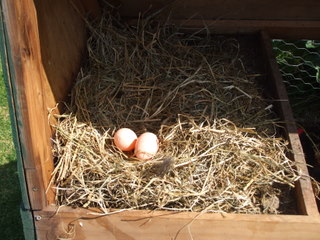One of the most annoying habits that a chook can acquire is to start eating their own eggs; it brings your main product down to zero, means you are feeding them for nothing and it gets old really quickly when you have to rush out to the chook pen when they make egg-noises to find nothing there, or worse a wet spot on the bedding. Plus once one chook starts the others pick up the habit really quickly and once in place the habit can be hard to break. It is a pain in the bum big time, but with a bit of knowledge and understanding it is possible to work a way around it without getting an axe involved.
There are a number of circumstances that can start off egg eating –
- Lack of calcium – this should not be a problem if you are feeding commercial rations but if you are making your own rations make sure to include plenty of shell grit. It is OK to feed chooks egg shells so long as they are not recognisable as eggs, so grind them up to a fine powder before adding to the chooks rations.
- Boredom – whoever said that the devil makes work for idle hands (or in this case, beaks) wasn’t thinking about chooks when they said it, but the idea still holds. Bored animals can get up to all sorts of unwanted behaviours so some form of activity is good.
- Overcrowding – we found this to be a problem when we put the three new chooks in with the three existing chooks into the chook tractor. Too many chooks in a small area, I believe caused our outbreak of egg eating and it did not stop when we dropped from six chooks back to four in the tractor.
- Broken eggs – if the laying area is lacking in soft material then eggs can get broken when chooks are moving around on the nest and, being inquisitive creatures the chooks will investigate this new phenomenon and discover a highly undesirable culinary treat.
If you do suspect that egg eating is happening it may be shown by an unexplained drop in egg production and/or investigation of chooks making egg noises and finding nothing there or finding broken/half eaten eggs or the above mentioned wet spot.
So the next question is, what can you do about it? Fortunately, lots of things but if you do think you may have an outbreak of egg eating it is important to act quickly, before other chooks can pick up the habit and before the miscreant can cement the habit in their chooky brain. To start with –
- Make sure that the nesting area is full of lots of soft fluffy material to reduce the likelihood of accidental breakage, and
- Check for eggs three or four times a day if you can, so the freshly laid eggs are not lying around in the pen and presenting a temptation to bored or hungry chooks. We tried for a while to run out every time we heard a chook making egg noises, but after a while I’m sure they did it just to watch us run out, and then giggle behind our backs as we went back into the house empty handed.
If the outbreak is confirmed and has gone past the early stages there are still a number of actions that you can take –
- Make a hand grenade egg - Get hold of a whole egg, make a small hole in each end and blow out the contents (which are then available for use) and fill the egg with chilli sauce, Tabasco sauce or any other hot sauce you have and place it in the nest. The miscreant chook will take it for a fresh egg and proceed to enjoy it, thus getting a beak full of the hot stuff and be put off doing it again. This may require to be done a number of times. At the same time -
- Get hold of some artificial eggs, back when I was a young fella you used to be able to get plastic eggs with sand in them that you could use to show the chooks where to lay, you can still get plastic eggs for decorative purposes and these will work too. Place several in the laying area and they will try and eat them, to no avail and then hopefully get out of the habit. I have even heard that golf balls will fulfil the same function, but we used plastic eggs and they worked well.

If all else fails, turn them into soup!



